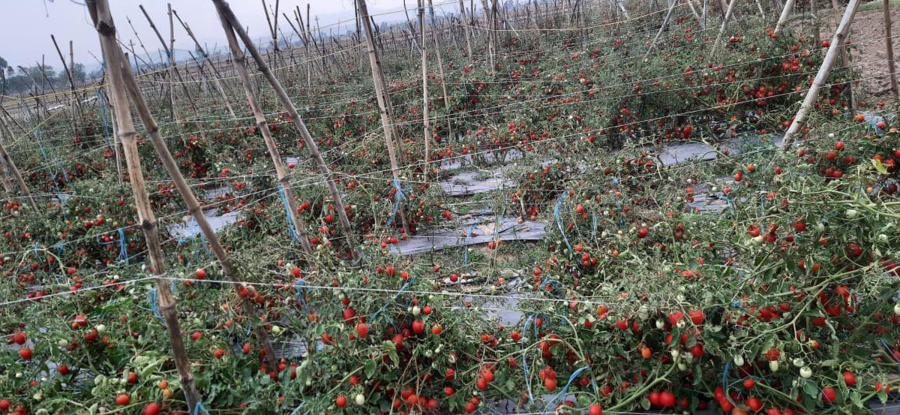Money
Vegetables rot in the fields as lockdown paralyses market
Groceries are allowed to open briefly in the morning and sales are at minimum level, traders say.
Pratap Bista & Krishana Prasain
Farmer Sundar Raj Balami is seeing a replay of last year's Covid-19 disaster when his vegetables rotted in the fields as he couldn't get them to market.
This year, the lockdown that began on April 29 in the Kathmandu Valley has prevented him from harvesting his ready-to-pick cauliflowers, and he is an anguished man as he watches his vegetable crop wither in the fields.
Before the stay-at-home order was issued, business was brisk. He was selling his cauliflowers for Rs50 per kg, and he had expected this year's increased earnings to offset the losses of the past year.
But that was not to be. Even if he manages to sell a small quantity of his harvest, he won’t get more than Rs10 per kg because buyers are not coming, and he has no market access, he said.
“At that price, I won't even break even,” said Balami of Thaha Municipality-9.
The lockdown has brought down consumption levels, the major economic indicator, and affected the supply chain. This is not a good sign for the country’s economy which suffered a negative growth rate in the last fiscal year, economists said.
Problems began for the farmers after the second lockdown was imposed on April 29 in the Kathmandu Valley, a major vegetable consuming market with its massive population. The stay-home order was extended to May 27 as the country struggled frantically to contain the second wave of the pandemic.
Not only Balami, other farmers in Makwanpur have been hit too as their vegetables have ripened in the fields, but they are unable to ship them to market because of the government's restriction orders.
Nirmala Bidari of Bajrabarahi had planted cauliflower on two and a half ropanis of land. After the lockdown, the business outlook changed abruptly in the middle of the key harvest season, and now she is worried she may lose the season's projected earnings.
She had sold the cauliflowers she had planted on one ropani at Rs50 per kg, now she is not sure whether the market will reopen any time soon.
Bidari had also planted akbare chilli or red round chillies that look like they will dry up under the hot sun too.
“No vegetable traders are coming to the farmers due to the lockdown,” said Bidari. There is no government mechanism to help farmers sell their produce.
Farmer Uttam Upreti of Hadikhola-3 said only a fraction of the crop reaches the market.
The farmers fields hold a bountiful crop of cauliflower, eggplant, cabbage, cucumber, tomato and bitter gourd ready to be harvested.
According to Uttam Subedi, a vegetable trader from Bisingkhel of Thaha Municipality, vegetable consumption has declined steeply in the Kathmandu Valley. "Before the lockdown, we used to send 10-12 pick-up loads of fresh vegetables to the capital. Now, we are shipping barely two pick-up loads," he said.
"With sales down at the Kalimati Fruits and Vegetable Market, the country’s largest vegetable market, due to the lockdown, traders are staying home and farmers are dumping their produce," Subedi said.
Farmers in Bajrabarahi of Thaha Municipality-6 are not even getting Rs5 for a kg of fresh vegetables. As production is plentiful, the harvest is normally dumped in the fields because of lack of storage and processing facilities in most districts across the country, traders said.
Dairy farmers are suffering a similar misfortune. There are reports that dairy farmers are pouring their milk on the road as collection centres are not buying it.
Hotels, restaurants and small eateries, all of which have been shut down, were their largest customers.
Groceries and department stores are allowed to open for a limited time in the morning, but sales are at minimum level, traders said.
“Of the total milk production, only 40 percent is reaching the market. The rest is being wasted,” said Prahlad Dahal, general secretary of the Nepal Dairy Association.
Dairy farmers, especially those who produce on a commercial scale, have been incurring heavy losses, he said.
“We cannot buy milk from farmers as demand is less than half,” Dahal said. “We purchased milk from farmers last year to make milk powder. This year there is a huge unsold stock of milk powder and butter. We are not able to buy milk from farmers this time due to surplus milk powder and butter,” he said.
Sales of dairy and dairy-related products are down by around 60 percent. Dahal said dairy products valued at around Rs100 million had gone to waste due to the closure of the market.
“Farmers are not getting their money on time as there are no sales at all.” According to Nepal Dairy Association, the unsold inventory of powder milk and butter currently stands at Rs3 billion.
Although sales of dairy products started to rebound after the lockdown was lifted in July last year, sales were still on the lower side as restaurants and hotels, the major buyers, did not open fully.




 13.12°C Kathmandu
13.12°C Kathmandu














